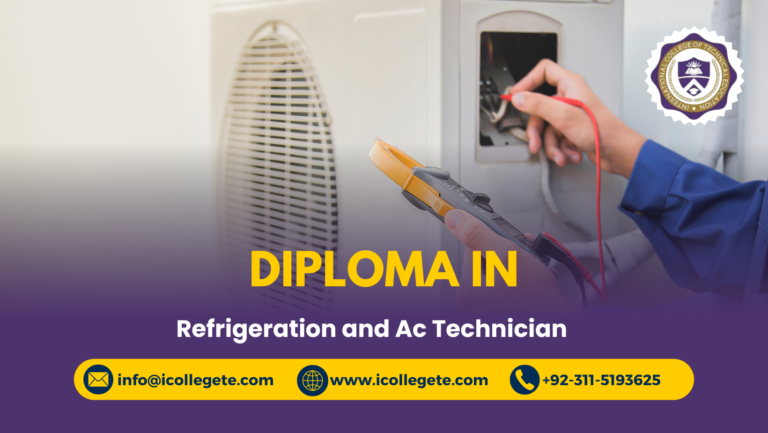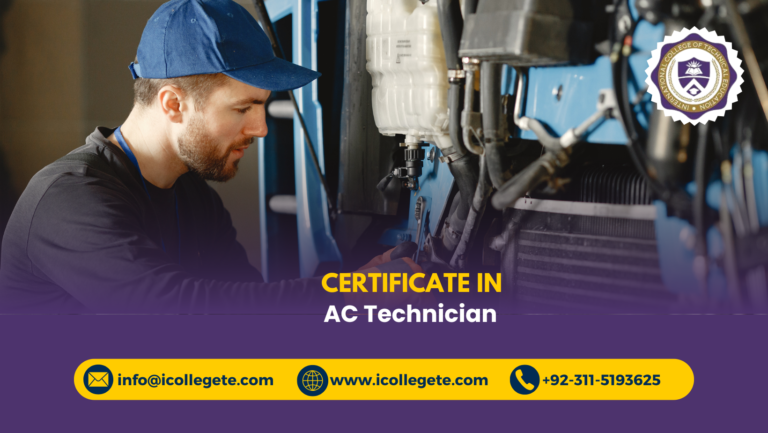Air conditioning (AC) systems are no longer just a luxury; they have become essential in homes, offices, commercial spaces, and industries worldwide. The growing demand for cooling systems has resulted in a high need for skilled technicians who can install, maintain, and repair these systems. The Diploma in AC Technician course is an ideal pathway for anyone interested in entering this rewarding and in-demand field. This blog post provides an overview of the course, its benefits, and who would benefit from enrolling.
The Diploma in AC Technician is a specialized technical program designed to provide students with the skills and knowledge required to work with various air conditioning systems. From installation and maintenance to troubleshooting and repair, this course prepares students for a career in the fast-growing HVAC (Heating, Ventilation, and Air Conditioning) industry. The program covers both traditional and modern air conditioning systems, making graduates well-equipped to handle a wide range of cooling technologies.
Course Overview
This diploma program covers a comprehensive curriculum that includes the theory and practical applications of air conditioning and refrigeration systems. The course will teach students how AC systems work, the components involved, and how to maintain, troubleshoot, and repair them efficiently. It also incorporates modern cooling technologies, including eco-friendly refrigerants and energy-efficient systems.
Key Highlights:
- Duration: Typically 6 months to 1 year, depending on the institution.
- Mode of Study: Available in full-time, part-time, or online formats.
- Hands-On Training: Includes practical labs and field training to ensure students gain real-world experience.
- Industry Relevance: The course is designed in line with the latest industry standards and advancements in AC technology.
Learning Outcomes
Upon successful completion of the Diploma in AC Technician course, students will be able to:
- Understand the Basics of Air Conditioning: Learn how air conditioning systems work, including the refrigeration cycle, heat transfer, and various types of AC units.
- Install and Maintain AC Systems: Gain hands-on experience in installing, servicing, and maintaining different types of air conditioning systems.
- Troubleshoot and Repair AC Units: Develop diagnostic skills to identify and solve issues in AC systems, including mechanical, electrical, and refrigerant problems.
- Work with Refrigerants and Environmental Standards: Understand the environmental impact of refrigerants and how to handle them according to industry safety standards and regulations.
- Ensure Energy Efficiency: Learn to install and maintain energy-efficient systems, reducing energy consumption and lowering operational costs.
- Use AC Diagnostic Tools: Master the use of diagnostic tools and modern software used for troubleshooting and maintaining AC units.
- Safety Practices: Gain knowledge of safety protocols, including working with high-voltage systems and handling refrigerants safely.
Study Units
The curriculum for the Diploma in AC Technician includes both theoretical and practical units, ensuring students gain a comprehensive understanding of the field. Key study units include:
- Introduction to Air Conditioning – Overview of air conditioning principles, types of systems, and their applications.
- Refrigeration Cycle – Study of the refrigeration cycle, heat exchange, and the principles of cooling in AC systems.
- Components of AC Systems – Understanding key components like compressors, evaporators, condensers, and expansion valves.
- AC Installation and Maintenance – Techniques for installing, maintaining, and servicing air conditioning units in residential, commercial, and industrial environments.
- Troubleshooting AC Units – Methods for diagnosing and repairing common AC issues such as cooling failure, leaks, and electrical problems.
- Refrigerants and Environmental Impact – Knowledge of refrigerants, their types, environmental concerns, and legal regulations.
- Energy Efficiency in AC Systems – Study of energy-saving techniques and how to optimize AC systems for improved efficiency.
- Electrical and Mechanical Systems in AC Units – In-depth knowledge of the electrical circuits, motors, and mechanical systems that drive AC units.
- Health and Safety Protocols – Safety standards and practices when handling high-voltage systems and refrigerants, as well as general site safety.
Course Benefits
- High Demand for Technicians: The increasing reliance on air conditioning systems in both residential and commercial settings has led to a consistent demand for skilled AC technicians.
- Comprehensive Skill Set: The course covers a wide range of skills, from installation and maintenance to troubleshooting and energy-efficient system design, ensuring that graduates are versatile and job-ready.
- Career Opportunities: Graduates can find employment in a variety of sectors, including residential services, commercial HVAC companies, industrial operations, and more.
- Hands-On Experience: Practical labs and real-world fieldwork prepare students for the actual tasks they’ll face on the job, increasing their employability.
- Job Security and Growth: With the global increase in the demand for HVAC systems, technicians with the right qualifications have a solid future with job security and career growth potential.
- Competitive Salaries: AC technicians are well-compensated for their skills, especially those with experience in advanced or energy-efficient systems.
- Industry-Relevant Training: The course curriculum is updated to reflect the latest trends and technologies in air conditioning, ensuring that graduates are prepared for the evolving HVAC industry.
Who is This Course For?
The Diploma in AC Technician course is suitable for:
- Aspiring Technicians: Individuals who want to build a career in the HVAC industry and specialize in air conditioning systems.
- Existing Tradespeople: Electricians, plumbers, or mechanics looking to expand their skill set into air conditioning and refrigeration systems.
- Engineering Graduates: Those with a background in engineering who want to specialize in HVAC technologies.
- Job Seekers: Individuals looking to enter the growing HVAC sector with specialized knowledge and hands-on experience.
- Entrepreneurs: Those interested in starting their own HVAC maintenance, installation, or repair business.
- People Interested in Sustainable Technology: With a growing emphasis on energy-efficient systems and eco-friendly refrigerants, this course is also perfect for individuals passionate about sustainability in technology.
The Diploma in AC Technician is a great choice for anyone looking to start or advance their career in the thriving HVAC industry. With the right combination of technical knowledge, practical skills, and industry standards, graduates of this course will be in high demand in a range of settings. Whether you want to work with residential air conditioning systems, large commercial units, or advanced energy-efficient models, this diploma will provide you with the expertise to succeed.
If you’re looking for a stable, rewarding career with opportunities for growth and advancement, the Diploma in AC Technician could be the perfect fit. Enroll today and become a highly skilled professional in the rapidly growing field of air conditioning technology!





